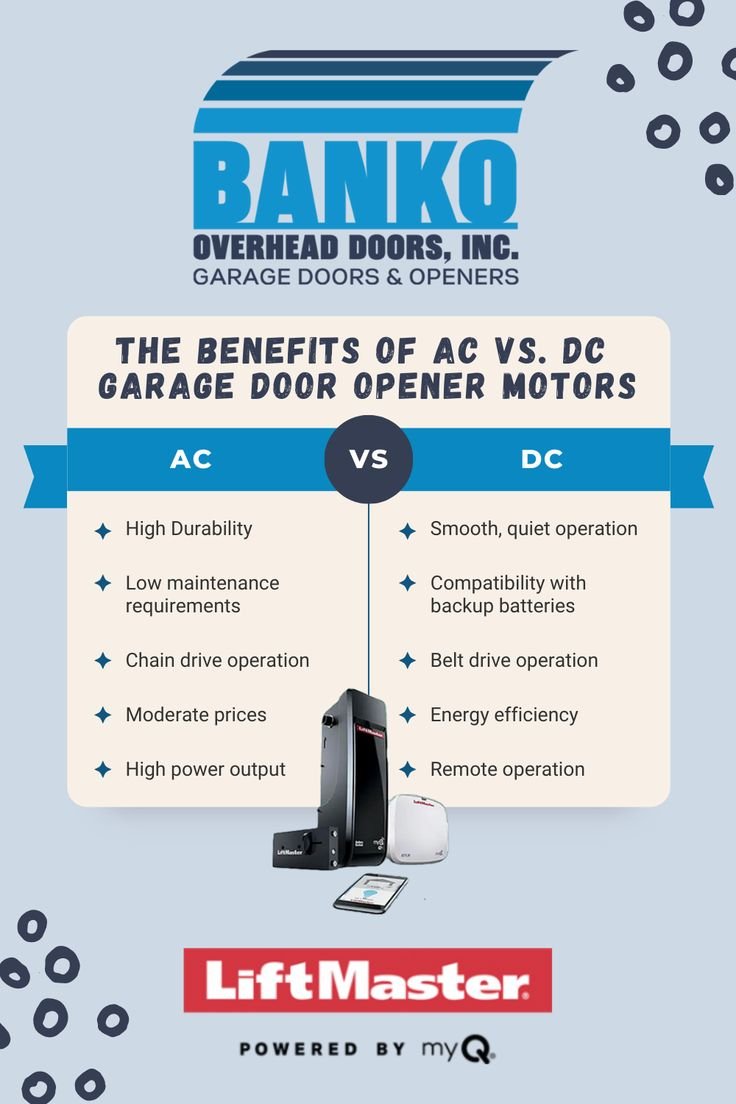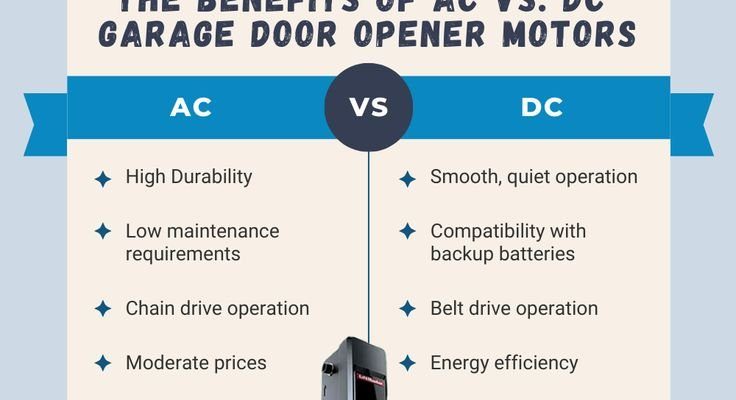
Let’s dive into the world of motors, focusing on the significant players: the Brushless DC motor and the AC rotor/stator motor. We’ll explore how they work, what makes them tick, and which one shines in specific situations. By the end, you’ll have a clearer picture of which motor might be the best fit for your garage door opener. So, grab a cup of coffee, and let’s unpack the details!
Understanding the Basics: AC Motors
AC motors, short for alternating current motors, have been around for a long time and are widely used in various applications, including garage door openers. They rely on an electromagnetic field generated by alternating electrical currents to create motion. Picture a bicycle wheel spinning rapidly; that’s how the rotor inside the motor operates.
There are two main types of AC motors: induction motors and synchronous motors. Induction motors are the most common for garage doors due to their reliability and straightforward design. These motors are often less expensive, which can be a significant factor for homeowners looking to save some bucks.
However, there’s a catch. While they can be robust and durable, AC motors tend to be noisier than their brushless DC counterparts. That’s something to consider if you need your garage to be quieter, especially if it’s attached to your home. Also, with more moving parts, there’s more potential for wear and tear over time.
Breaking Down Brushless DC Motors
Now, let’s talk about brushless DC motors. As the name suggests, these motors don’t use brushes to convert electrical energy into mechanical energy, resulting in less friction and wear. Imagine it like a bicycle where you haven’t just oiled the chain but completely upgraded to a smoother system. This design translates into a quieter operation and longer lifespan.
Brushless motors are known for their high efficiency. They use permanent magnets and electronic controllers to regulate their operation. This technology gives you a smoother performance, and they often have adjustable speeds, making it easier to integrate with smart home systems. For instance, they can be used with smart remotes that allow you to open or close your garage door from your smartphone.
Because of their advanced technology, brushless motors can be more expensive upfront than AC motors. Yet, many users find that the benefits they bring—like quiet operation and energy efficiency—make it worth it in the long run.
Performance Comparison: Efficiency and Noise Levels
When deciding between AC and brushless DC motors, efficiency and noise levels are critical factors to weigh. Here’s a breakdown:
| Feature | AC Motor | Brushless DC Motor |
|---|---|---|
| Energy Efficiency | Moderate | High |
| Noise Level | Moderate to High | Low |
| Lifespan | Average | Longer |
Honestly, if you’re looking for a motor that operates quietly and is energy-efficient, a brushless DC motor might be your best bet. On the other hand, if budget constraints are more pressing, opting for an AC motor could help you save some cash without a huge sacrifice in function.
Durability and Maintenance Requirements
Let’s talk about durability and maintenance. AC motors generally have a rugged build, making them quite durable. They can withstand harsher conditions and often require fewer repairs. However, they do need maintenance, like periodic lubrication of the moving parts, to keep everything running smoothly.
Brushless DC motors, with their simple construction, usually require even less upkeep. There are no brushes to replace, and their electronic components tend to have a longer life if you don’t encounter too many power surges. However, the electronic parts can be sensitive, and in case of failure, repair could be trickier compared to a more traditional AC motor.
So, if you prefer a “set it and forget it” approach, a brushless DC motor might be a more appealing choice, while AC motors could require more regular TLC.
Cost Considerations: Upfront vs. Lifespan Expenses
When weighing the cost of your options, it’s crucial to think long-term. AC motors tend to be more affordable at face value, making them a popular choice for budget-conscious homeowners. However, they might incur higher electricity bills due to their lower efficiency.
On the flip side, brushless DC motors typically come with a higher price tag upfront. But because they are more energy-efficient and have longer lifespans, you might offset those initial costs over time through energy savings.
Consider this: if you’re planning to stay in your home long-term, investing in a brushless DC motor could save you money in energy costs and replacement parts down the road, making it a wise investment.
Compatibility with Existing Systems
You might be wondering how these motors fit into your current garage door setup. If you’re replacing an old opener, the motor type matters. AC motors have been the standard for ages, so you can usually swap one out for another without any issues.
However, if a brushless DC motor is something you want to explore, it’s essential to check compatibility with your existing door and opener system. Not all garage doors are designed to handle the variable speeds and torque of brushless motors, so a little research might be necessary here.
One realistic example: you might find an old chain drive garage door opener working fantastically with an AC motor. A new brushless DC motor could fit, but you might need to upgrade parts of the mechanism to accommodate the different operating style.
Control and Smart Features
A modern garage door opener is much more than just a motor. These days, many consumers want smart features that can integrate into their home automation systems. Brushless DC motors tend to embrace this technology better, offering options for remote control with smartphone apps, voice control, and integration with home security systems.
For example, using a brushless DC motor, you could synchronize it with your smart home device so that your garage door opens automatically when you arrive home. That’s not just a convenience; it also enhances security by ensuring your door operates correctly every time.
On the other hand, while some AC motor systems can connect to smart devices, they often don’t offer the same level of customization or adaptability that brushless motors do.
Environmental Impact and Energy Profile
If you’re eco-conscious, you might be interested in how these motors stack up environmentally. Brushless DC motors tend to be more energy-efficient, consuming less power during operation. That efficiency is crucial as more households seek to reduce their carbon footprint.
AC motors, although reliable and robust, draw more energy over time. This not only affects your electric bill, but it also adds to your overall environmental impact. If you want to make a sustainable choice, a brushless DC motor stands out as the better option.
Wrapping It All Up: Which Motor to Choose?
Choosing between a brushless DC motor and an AC rotor/stator motor ultimately depends on what matters most to you. If budget is your primary concern and you want a proven performer that gets the job done, an AC motor will suffice. They’re effective and durable for general use.
However, if you value energy efficiency, quieter operation, and advanced features, a brushless DC motor may be worth the extra investment. These motors can offer you smoother performance, greater control options, and savings in the long run.
In the end, thinking about your garage door opener is like thinking about which car to drive. Consider the journey you want—do you prefer the classic ride that’s reliable and cost-effective, or the sleek ride that’s quiet and tech-savvy? No matter what you choose, understanding these differences will help ensure you make an informed decision that suits your lifestyle.
